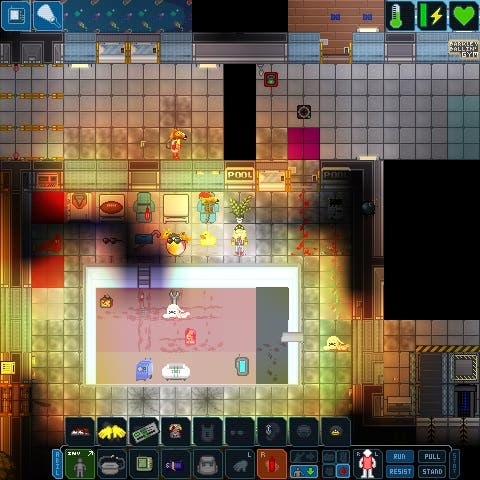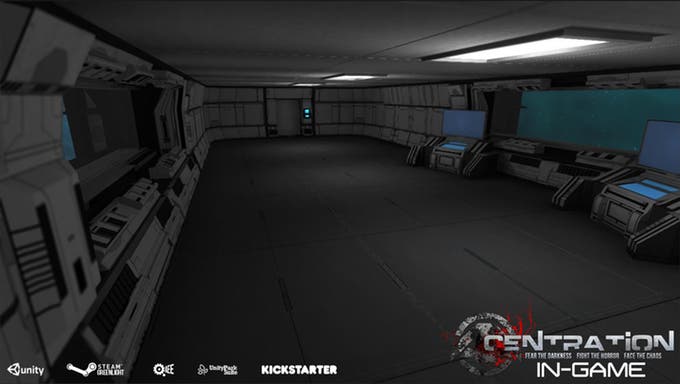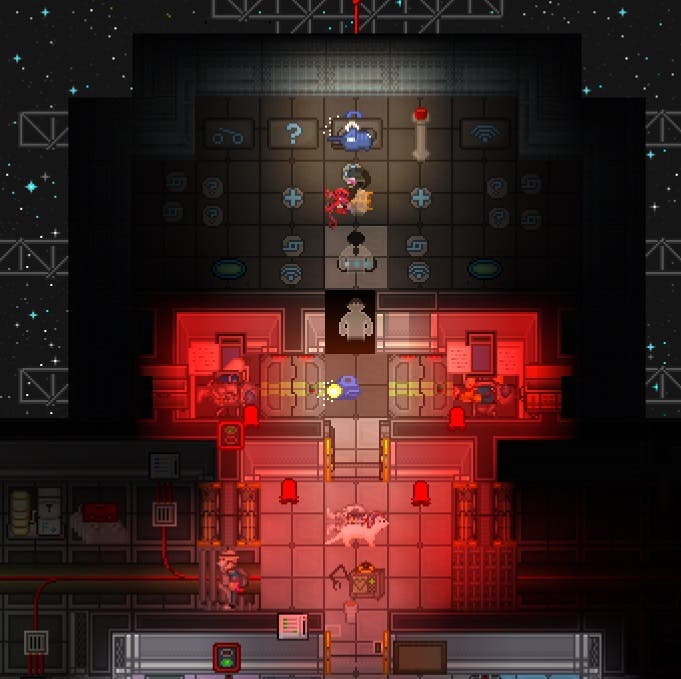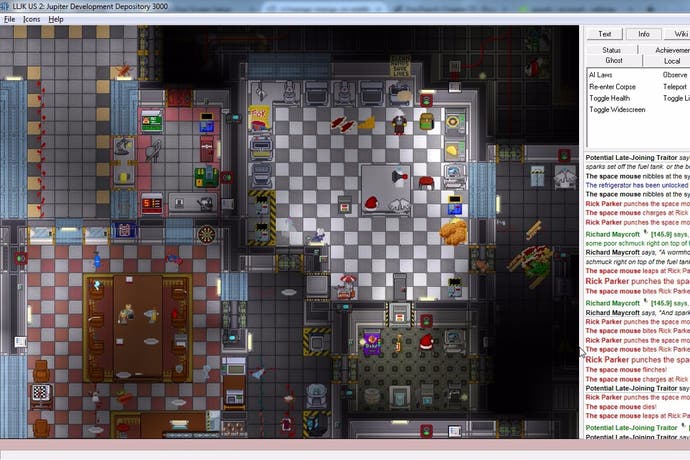The curse of Space Station 13
Why scores of developers have tried and failed to remake the greatest role-playing game you've never heard of.
It looks like a game from a bygone era. The 2D graphics are basic in the extreme. There are no animations to speak of. The viewpoint is top-down and staying that way. Its user interface rekindles memories of Windows 95. It is fiddly, abstruse and hugely complex. It is a slow burn of a video game, often demanding hours of intense concentration, planning and execution to succeed. And yet for some, Space Station 13, a community-created open source project coming up on its 15th birthday, is the greatest multiplayer role-playing video game ever made.
It is also hugely popular among video game developers, some of whom say the emergent gameplay Space Station 13 enables is the most interesting they've ever experienced. Perhaps that's why so many have tried to remake it over the years. But so far none have succeeded. This repeated failure to remake Space Station 13 has led to what's known among the game's community and developers as a curse. Some believe Space Station 13 cannot be remade. And yet, the attempts keep on coming.
To understand the Space Station 13 curse, you have to understand Space Station 13 itself. The problem is, Space Station 13 is really hard to understand, and so it's really hard to describe. It's perhaps best to start with the setup. Players choose from a selection of different jobs available on the crew of a futuristic space station called Space Station 13 (so named, its creator revealed in an interview, because bad things happen with the number 13 ). The players then play out the round, interacting with each other and the environment around them. There isn't much in the way of a grand goal or objective for the crew to put their minds to. It's more of a, well, let's see what happens kind of game.
What sets Space Station 13 apart is the coming together of a huge number of systems and mechanics. The engine the game is built upon, the "super old and super crappy" BYOND engine, as it has been called, lets players interact with pretty much any object or being on the station, and you'll get different results depending on the context. Here's a simple example: use a crowbar on another player and you'll attack them. Use it on a floorboard and you'll pry it up.

Adding to the complexity are four states of "intent": help, disarm, grab and harm. Each affects the interaction. For example, use an empty hand on another player with the help intent enabled and you'll hug them. Use an empty hand on another player with the harm intent, however, and you'll punch them.
Behind the basic graphics is an engine that simulates everything from station power to atmosphere, chemistry to biology. Research and development stations require resources and the patience to click through endless menus. There are multiple departments on the station, including Command, Security, Engineering and Medical. If you're working in Security, you need to enforce the law and respond to emergencies. If you're in Medical, you need to keep the crew healthy, research diseases and even create clones for dead players.
The spanner in the works is the player chosen by the game to act as the antagonist. Usually the antagonists have secret objectives. Kill everyone, perhaps. Escape. Sabotage. Steal. That sort of thing. This means most rounds end up in some sort of chaos. The station may even end up destroyed. But that chaos, that drama, is all part of the fun.
In the below video - one of the best let's plays of Space Station 13 I've seen - YouTuber ShitoRyu95 assumes the role of the station chaplain and is designated the traitor. He has two objectives: steal a chief medical officer's jumpsuit, and hijack the emergency shuttle by escaping alone. None of the other 14 role-players aboard know this. The chaplain must somehow go about his business, avoiding suspicion while setting up his masterplan via dastardly misdirection and intimate knowledge of Space Station 13's inner workings. It's a fantastic watch, and gets to the heart of how Space Station 13 is in essence a big simulated sandbox with complex rules - and where the gameplay emerges from the rules.
So, Space Station 13 is awesome in a very unique way, which is probably why so many developers have tried to remake it with more modern graphics and design sensibilities. There are 14 attempts listed in this article on Medium. None have come out. Most were unceremoniously cancelled. Some soldier on in development hell. Why? It is the curse of Space Station 13, developers whisper.
The most famous developer to try and fail to remake Space Station 13 is Dean Hall. Hall, known for creating the hugely popular multiplayer zombie survival game DayZ, tells me he's burnt though millions of dollars (he won't say exactly how many) trying to recreate Space Station 13. Ion, which was announced to much fanfare on-stage during Microsoft's E3 2015 press conference, was eventually cancelled, the most high-profile victim of the curse.
"What is the crux of the Space Station 13 curse? I say it is what I describe as mean time to feature," Hall tells me.
By mean time to feature, Hall means the average length of time it takes to implement a new feature.
"If we look at Ion, that was quite a long time, sometimes weeks," Hall continues. "If you look at DayZ or a triple-A game, you have to make really detailed art assets, you have to animate it, sometimes you have to do motion capture then you have to clean up the animations. You need to texture it. You need to get the materials right. Then you need to have the programmers do all the synchronisation. This can be weeks. This can be five weeks of work to get a new feature in the game."
The problem with remaking Space Station 13 is that it's got so much stuff going on in it that developers have so far struggled to recreate the complete package in a modern engine with anything approaching an efficient or economically viable timeframe. This was in part what led to Ion's costly cancellation.
"It's just money, right?" Hall quips. "Look, it's pretty rough.
"A lot of the remake attempts that have been made, they try and tackle the problem all at once. They tried take the bite all at once. You want to make all the systems good, right? This is what we tried to do with Ion. But it's just too much work. It takes too long. And length of time is sapping your motivation, and it's expensive. That's ultimately what kills stuff."
The origin of the Space Station 13 curse is difficult to pin down, but it looks like it owes much to multiple failed attempts to remake the game by someone who actually worked on Space Station 13 years ago. Aaron Challis, from Swindon, says the curse began after he tried and failed to remake Space Station 13 in 3D around 2012. This after he had leaked the source code to the game so others might try the same.
"I realised Space Station 13 had reached a point where it couldn't go further with the people involved with it," he tells me over Skype.
"At the time, I wasn't experienced enough to bring it to where it deserved to be at. And I didn't believe the other guys who were working with me could do that either. At that point I was just like, this is going to be better off if everyone else gets the chance. To be honest, doing that made Space Station 13 so popular today."
One of Challis' early attempts was simply called Space Station 13 3D, so on the nose was his plan to remake the game. He gave up on that quickly.
"I went to university, learnt some things, came back out and was like, okay, let's do this thing," he says. "After that it became Centration."

Centration was perhaps the most high-profile Space Station 13 remake attempt of the time. It aimed to recreate Space Station 13 in an ultra realistic setting and from a first-person perspective. The initial plan even included a construction system than involved players putting girders into place and slapping panels over them, and a medical system Challis describes as "a simplified version of Surgeon Simulator".
Challis and his team launched crowdfunding attempts to raise development cash on IndieGoGo (twice) and Kickstarter. All failed.
"A lot of people were really upset about that," Challis admits. "A bunch of other people tried to do their own little remakes. Then the Space Station 13 2D remake that was being made by the original guys who took over the code failed as well."
And thus, the curse of Space Station 13 was born. Now, whenever a Space Station 13-style game is announced, fans roll their eyes. When a Space Station 13-style game is cancelled, fans say, well, of course. "It [the curse] probably would be something to do with me!" Challis laughs.
Primulous was an ambitious Space Station 13-style game led by Joshua Salazar, of Flint, Michigan. After getting into Space Station 13 in early 2012, and with more advanced game development under his belt, he thought he'd have a crack at it. Tinkering in Unity, and enlisting the help of a programmer, Salazar started a company, created a website, hired an artist and got some marketing off the ground.
"I knew it [the curse] was there when I first started getting into this project, I just didn't care to be honest," Salazar tells me.
"We all know it's always there. Just the continuing failure of these projects is just reinforcing this curse over and over again. Now you see stuff on Space Station 13 forums all of the time and people are just like, here we go again. That's attributed to the curse. There's no positive attitude even with the start of these projects. People have such low expectations from the start."
About a year into the development of Primulous, funds began to run out, Salazar says. A Kickstarter launched in April 2014 with a working prototype honed by a handful of closed alpha tests. Salazar was particularly excited about Primulous' atmospheric system. "I can say with confidence we had a really good atmospheric system that was light CPU usage," he says, "it was a robust system. That was a big part of Primulous that would have been fun."
The Primulous Kickstarter failed and the project ended. The curse strikes again?
"Our marketing wasn't the best," Salazar, now an application developer for a local university, explains. "We had three people working on the game full-time and we were all taking on a lot of different tasks. We were doing everything at the same time. We didn't excel at any one specific area. We just didn't have the time to dedicate to making one specific thing awesome. That really is our fault - more so my fault. This was all on me.
"We didn't quite have a market. Space Station 13 is a very niche market. Primulous was following the same genre, and people didn't quite understand it. It was just a small market."
Of course, there isn't really a Space Station 13 curse, rather a combination of factors that make remaking the game incredibly difficult. It doesn't help that so many attempts have so far come from inexperienced developers, but even DayZ maker Dean Hall, with all his millions, tried and failed. Disheartened, some have declared Space Station 13 the impossible to remake video game. There's just too much to it, too much going on, to recreate in 3D.
The attempts to straight-up remake Space Station 13 remakes seem to have dried up. But that hasn't stopped people from making games inspired by Space Station 13. Barotrauma, from Finnish developer Joonas "Regalis" Rikkonen, is one of those games. And this one looks like it may actually come out. Could it be the game to finally break the curse?
"Barotrauma is heavily inspired by Space Station 13 so I guess I'm in a way trying to break the curse," Rikkonen says.
Rikkonen, whose last game was minor cult hit horror game SCP - Containment Breach, says he's using the concept of Space Station 13 as the basis of Barotrauma to make a more user-friendly and fast-paced version of the game. "I guess it could be called a casualised version of Space Space 13," he says.
"I won't even be trying to reach the complexity of Space Station 13. So, a solid, simpler version that takes the best parts of Space Station 13 without trying to become an enormously complex simulation as deep as Space Station 13."
Like Joonas Rikkonen, Dean Hall also reckons he's broken the Space Station 13 curse, this time with upcoming game Stationeers. And like Rikkonen, Hall's not trying to remake Space Station 13, as he did with Ion. Instead, he's simply using it as inspiration.
"It's important to acknowledge we are not making a Space Station 13 remake," Hall stresses. "I do think a remake will be possible through modding, but I'm personally not that interested in the round base nature of Space Station 13. I'm interested in seeing what Space Station 13 looks like when you give it persistence.
"The problem is, when I play Space Station 13 I'm left going away wishing the effort I put in didn't disappear. So when I play a round, I want my character to carry on. I hate that character disappears. That character had experiences and activities and behaviours, and I want to see how that affects people's decisions as they go on."
For Hall, who says he's been trying to "knock this issue out for six years of my life", the light is at the end of the tunnel. Stationeers, "which is like my third or fourth attempt", goes into Early Access on 13th December 2017, curse permitting of course.
Is Space Station 13 the impossible remake? All the developers I spoke to for this article remain convinced it is possible, just rock hard and pretty unlikely.
"I've always said if you wanted to make a brute force remake of Space Station 13, the top down version we all love, and take that into 3D, I think that's highly possible," Challis says. "I think it can be done, especially with money and a team. I guess it's just a lack of interest that's prevented that from happening."
This lack of interest taps into the inaccessibility of Space Station 13. It's something all games based upon - and even inspired by - Space Station 13 suffer from, like a hereditary disease.

"I tried to get a few people playing Space Station 13, and getting them to even install the software in the first place was a pain," Challis laments.
"When they finally got in there, they were like, 'I have no idea what I'm doing.' By that point I'm already running around on the other side of the station doing some other things, so I can't really help them. It's that kind of game. You have to know how to play the game to play the game."
Hall says Stationeers suffers from this issue, too.
"Stationeers is a hard sell," Hall says. "That's something Space Station 13 suffers from. How do you tell someone what it is? The only way you can tell someone what Space Station 13 is, is by telling them everything they can do. I have been playing Space Station 13 for years, weekly, and I still have not done everything there is to do in that game. I've never worked in research and development."
What would it take to break the curse? Games such as Barotrauma and Stationeers, which look like they will in fact come out, are not Space Station 13 remakes, and so the curse, while dented by their success, remains undefeated.
But Space Station 13, warts and all, still causes developers to dare to dream about what a proper remake could look like. "There's a certain draw to it," Salazar says.
"There's just so much to draw inspiration from, whether you're interested in atmospherics or medicine or security or whatever, there's something there to draw you in."
Salazar has given up on his dream of remaking Space Station 13 ("I'm going to let someone else carry that torch"), but he eloquently explains why developers continue to want to try:
"The depth appealed to me. Personally I like learning. I like trying stuff out. The unknown is something I like to try and overcome. That along with how much was happening and all of the cool stories that were coming out of every round, that feedback loop was what kept me going. Over time I just learned it. Even today I fumble over the controls. I struggle to lock a locker.
"It's definitely an inaccessible game with a very, very steep learning curve. But that's also what draws us to want to remake this. We know there are better platforms out there and we can make it more accessible and we can help people get over that learning curve with tutorials and better visuals and things like that."
Perhaps that's why Challis remains determined to see Centration through to the bitter end.
"Overall, the entire dev cycle so far has cost in excess of about £20,000," he admits. "I've been trying to make Centration a thing since 2006. I'll spend my life doing it if I have to. I don't mind."
Fans hope one day someone somewhere will succeed and break the curse of Space Station 13. Until then, well, you can always play the original. If you dare.














